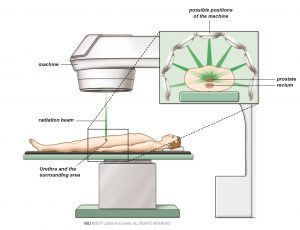Primary radical urethrectomy
Your doctor will recommend complete removal of the urethra (urethrectomy), including part of the bladder and the surrounding tissue to ensure the highest chance of cure. Usually, the bladder neck is closed during the procedure, and a new way to store and regulate the flow of urine is created (urinary diversion).
Urethra-sparing surgery might be feasible in selected cases. Ask your doctor if urethra sparing surgery is an option for you and what this would mean for you.
Urethra-sparing surgery
Your doctor may recommend urethra-sparing surgery as an alternative if cancer is very near the opening. However, these procedures have high rates of incontinence and require very close monitoring. There is a high risk of recurrence and eventually additional surgery with radical urethrectomy.
To preserve the urethra, your doctor may recommend radiation therapy. Your tumour and the surrounding regions would be treated with therapeutic radiation to kill all cancer cells. To achieve best possible tumour therapy, healthy tissue would be located within the treatment field. This approach may cause side effects like narrowing of the urethra, radiation-related bladder inflammation, or recurrent bleeding.
Radiation therapy
Radiation therapy to treat cancer is a well-established treatment option. High-energy radiation is used to destroy cancer cells (Fig. 3). Usually, no anaesthesia is needed for radiation therapy. The radiation oncologist will position you on the treatment table and make sure that you cannot move during the treatment. You will be given pads or cushions to make it as comfortable as possible for you to keep still. While radiation therapy is carried out, the radiation oncologist will leave the room and monitor you from outside, but you will be able to talk the whole time. Beams from one or more directions may be used.
The amount of time that each beam is focused on a certain point is calculated before treatment starts.


